Citroen C4 2014.5 2.G Owner's Manual
Manufacturer: CITROEN, Model Year: 2014.5, Model line: C4, Model: Citroen C4 2014.5 2.GPages: 494, PDF Size: 21.47 MB
Page 181 of 494
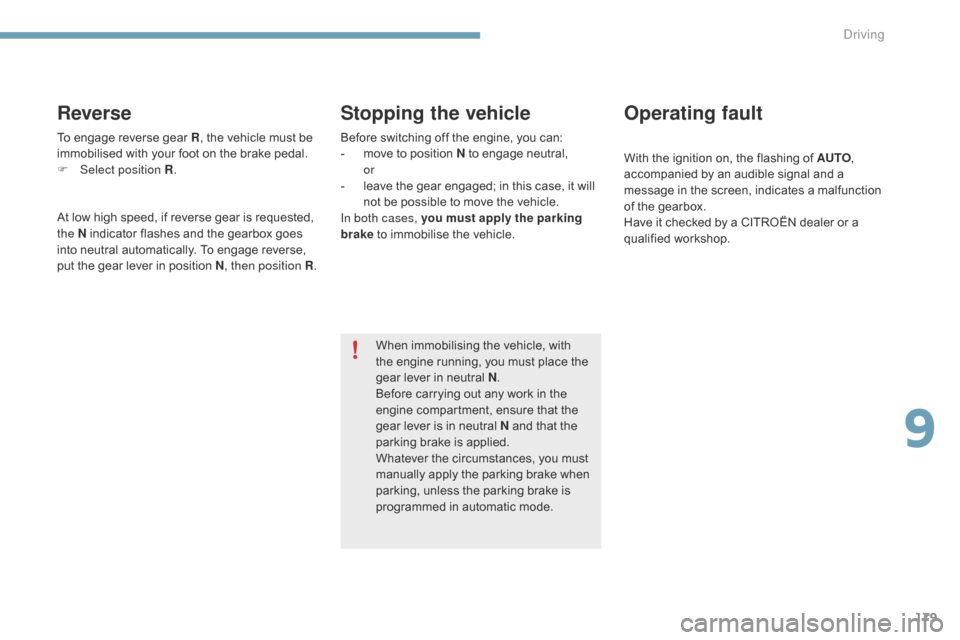
179
At low high speed, if reverse gear is requested, the N indicator flashes and the gearbox goes
i
nto neutral automatically. To engage reverse,
p
ut the gear lever in position N, then position R .
Reverse
To engage reverse gear R, the vehicle must be i
mmobilised with your foot on the brake pedal.
F
Sel
ect position R .
Operating fault
Stopping the vehicle
When immobilising the vehicle, with t
he engine running, you must place the
g
ear lever in neutral N.
Before
carrying out any work in the
e
ngine compartment, ensure that the
g
ear lever is in neutral N and that the
p
arking brake is applied.
Whatever
the circumstances, you must
m
anually apply the parking brake when
p
arking, unless the parking brake is
p
rogrammed in automatic mode.
Before
switching off the engine, you can:
-
m
ove to position N to engage neutral,
or
-
l
eave the gear engaged; in this case, it will
n
ot be possible to move the vehicle.
In both cases, you must apply the parking
brake
to immobilise the vehicle.
With the ignition on, the flashing of AUTO
,
accompanied by an audible signal and a
m
essage in the screen, indicates a malfunction
o
f the gearbox.
Have it checked by a CITROËN dealer or a
q
ualified
w
orkshop.
9
driving
Page 182 of 494
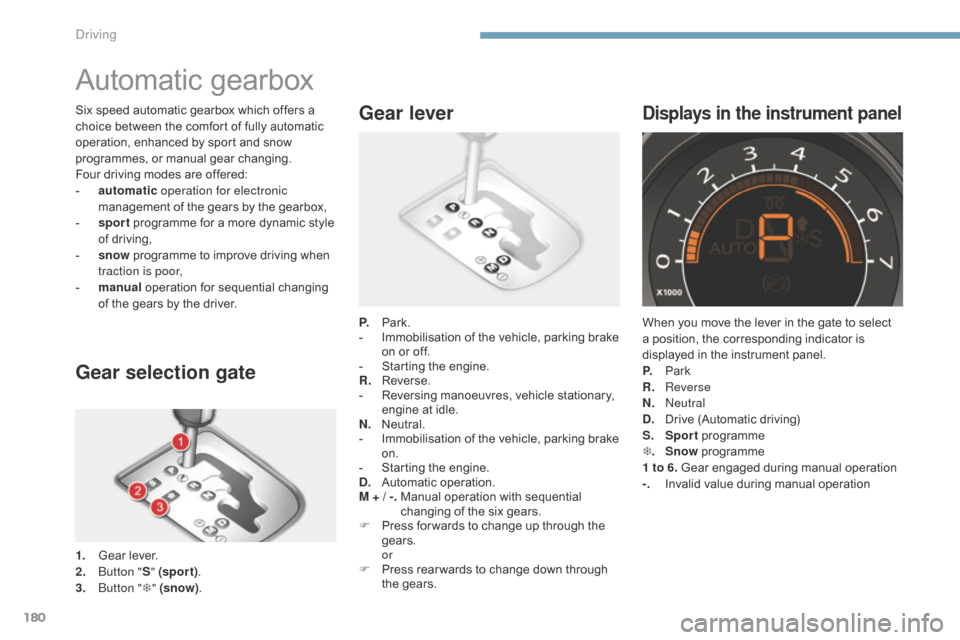
180
Automatic gearbox
Gear selection gate
1. Gear lever.
2. bu tton "S" (spor t) .
3.
b
u
tton "T" (snow) . P.
P
ark.
-
I
mmobilisation of the vehicle, parking brake
o
n or off.
-
S
tarting the engine.
R.
R
everse.
-
R
eversing manoeuvres, vehicle stationary,
e
ngine at idle.
N.
N
eutral.
-
I
mmobilisation of the vehicle, parking brake
o
n.
-
S
tarting the engine.
D.
A
utomatic
ope
ration.
M + / -.
M
anual operation with sequential
c
hanging of the six gears.
F
P
ress for wards to change up through the g
ears.
or
F P ress rear wards to change down through
t
he gears.
Gear lever
When you move the lever in the gate to select a position, the corresponding indicator is
d
isplayed in the instrument panel.
P.
P
ark
R.
R
everse
N.
n
e
utral
D.
D
rive (Automatic driving)
S.
Sp
ort
pro
gramme
T .
S
now
pro
gramme
1 to 6.
Gear engaged during manual operation
-.
I
nvalid value during manual operation
Displays in the instrument panelSix speed automatic gearbox which offers a choice between the comfort of fully automatic
o
peration, enhanced by sport and snow
p
rogrammes,
o
r
m
anual
g
ear
c
hanging.
Four
driving modes are offered:
-
a
utomatic operation for electronic
management
of the gears by the gearbox,
-
sp
ort
programme for a more dynamic style
o
f driving,
-
s
now
programme to improve driving when
t
raction is poor,
-
m
anual
operation for sequential changing
o
f the gears by the driver.
Driving
Page 183 of 494
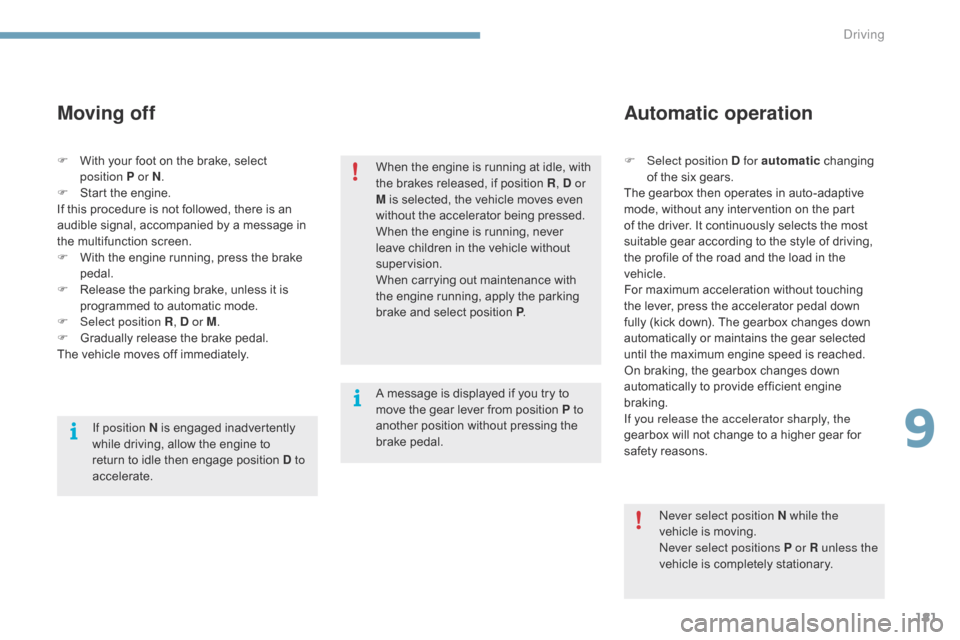
181
Moving off
A message is displayed if you try to move the gear lever from position P to
another
position without pressing the
b
rake
ped
al. F
Sel
ect position D for automatic
c
hanging
o
f the six gears.
The gearbox then operates in auto-adaptive
m
ode, without any intervention on the part
o
f the driver. It continuously selects the most
s
uitable gear according to the style of driving,
t
he profile of the road and the load in the
v
ehicle.
For maximum acceleration without touching
t
he lever, press the accelerator pedal down
f
ully (kick down). The gearbox changes down
a
utomatically or maintains the gear selected
u
ntil the maximum engine speed is reached.
On braking, the gearbox changes down a
utomatically to provide efficient engine b
raking.
If you release the accelerator sharply, the
gearbox
will not change to a higher gear for
s
afety reasons.
When
the engine is running at idle, with
t
he brakes released, if position R
, D or
M is selected, the vehicle moves even
w
ithout the accelerator being pressed.
When the engine is running, never
l
eave children in the vehicle without
sup
ervision.
When carrying out maintenance with
t
he engine running, apply the parking
b
rake and select position P
.
ne
ver select position N while the
vehicle
is moving.
ne
ver select positions P or R unless the
vehicle
is completely stationary.
If position N
is
engaged
inadvertently
w
hile
driving,
allow
the
engine
to
r
eturn
to
idle
then
engage
position
D to
accelerate.
F
W
ith
your
foot
on
the
brake,
select
p
osition
P or N
.
F
S
tart
the
engine.
If
this
procedure
is
not
followed,
there
is
an
a
udible
signal,
accompanied
by
a
message
in
t
he
multifunction
screen.
F
W
ith
the
engine
running,
press
the
brake
ped
al.
F
R
elease
the
parking
brake,
unless
it
is
p
rogrammed
to
automatic
mode.
F
Sel
ect position R
, D or M.
F
G
radually
release
the
brake
pedal.
The
vehicle
moves
off
immediately.
Automatic operation
9
Driving
Page 184 of 494
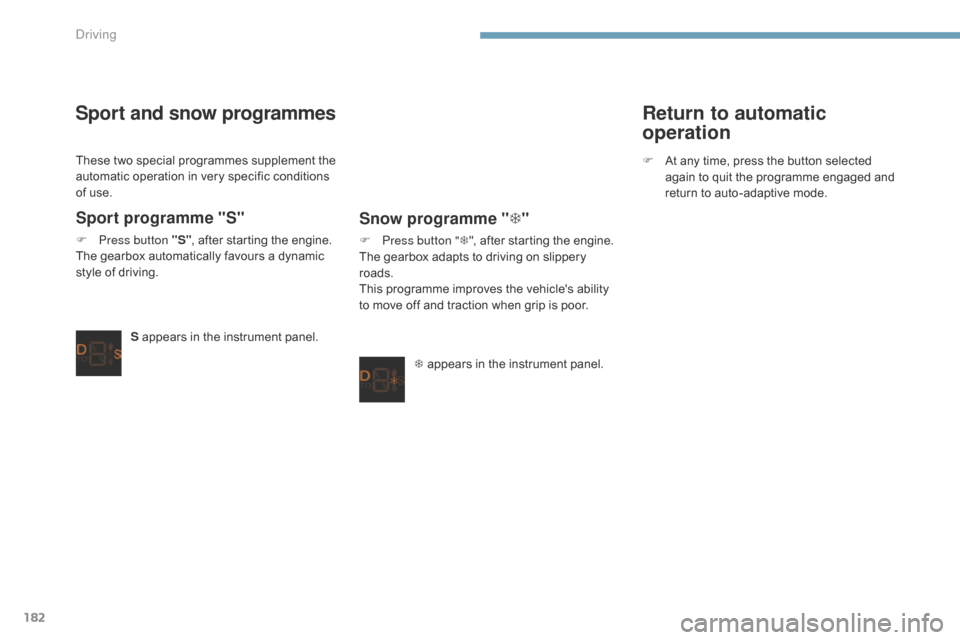
182
These two special programmes supplement the automatic operation in very specific conditions
o
f use.
Sport programme "S"
F Press button "S" , after starting the engine.
The gearbox automatically favours a dynamic
s
tyle of driving.
S
appears in the instrument panel.
Snow programme "T"
F Press button " T", after starting the engine.
The gearbox adapts to driving on slippery
r
oads.
This
programme improves the vehicle's ability
t
o move off and traction when grip is poor.
T
appears in the instrument panel.F
A
t any time, press the button selected
a
gain to quit the programme engaged and
r
eturn to auto-adaptive mode.
Sport and snow programmes
Return to automatic
operation
Driving
Page 185 of 494
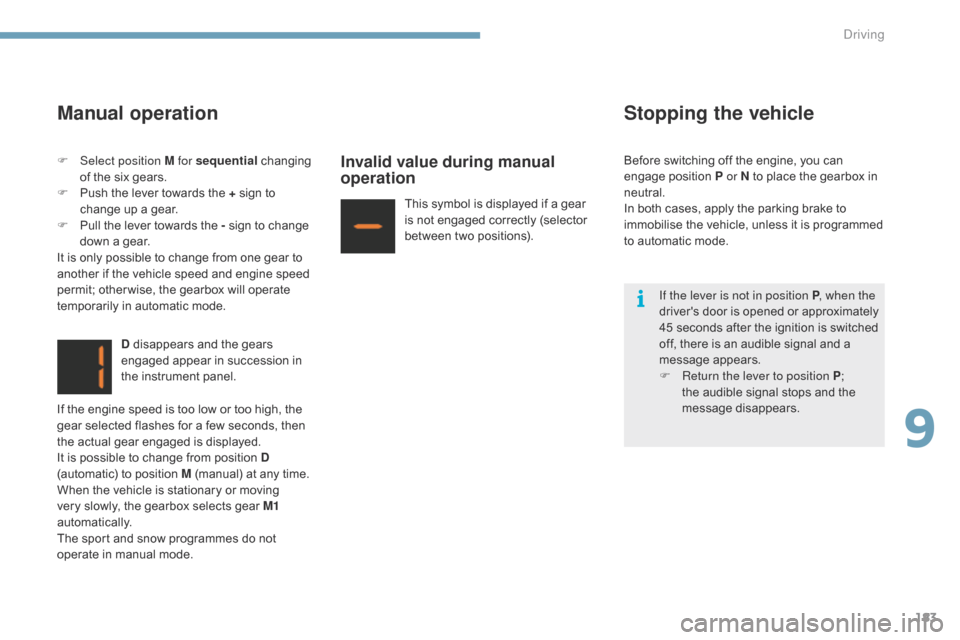
183
Manual operation
D disappears and the gears engaged appear in succession in
t
he instrument panel.
Invalid value during manual
operation
This symbol is displayed if a gear is not engaged correctly (selector
b
etween two positions).
Stopping the vehicle
If the lever is not in position P , when the
driver's d oor i s o pened o r a pproximately
4
5 seconds after the ignition is switched
o
ff, there is an audible signal and a
m
essage
ap
pears.
F
R
eturn the lever to position P ;
t
he audible signal stops and the
m
essage
d
isappears.
F
Sel
ect position M for sequential
c
hanging
o
f
the
six
gears.
F
P
ush
the
lever
towards
the
+
sign
to
c
hange
up
a
gear.
F
P
ull
the
lever
towards
the
-
sign
to
change
d
own
a
gear.
It
is
only
possible
to
change
from
one
gear
to
a
nother
if
the
vehicle
speed
and
engine
speed
p
ermit;
other wise,
the
gearbox
will
operate
t
emporarily
in
automatic
mode.
If
the
engine
speed
is
too
low
or
too
high,
the
g
ear
selected
flashes
for
a
few
seconds,
then
t
he
actual
gear
engaged
is
displayed.
It
is
possible
to
change
from
position
D
(automatic)
to
position
M
(manual)
at
any
time.
When
the
vehicle
is
stationary
or
moving
v
ery
slowly,
the
gearbox
selects
gear
M1
automatically.
The
sport
and
snow
programmes
do
not
o
perate
in
manual
mode. Before
switching off the engine, you can
e
ngage position P or N to place the gearbox in
neu
tral.
In
both cases, apply the parking brake to
i
mmobilise the vehicle, unless it is programmed
t
o
automatic mode.
9
Driving
Page 186 of 494
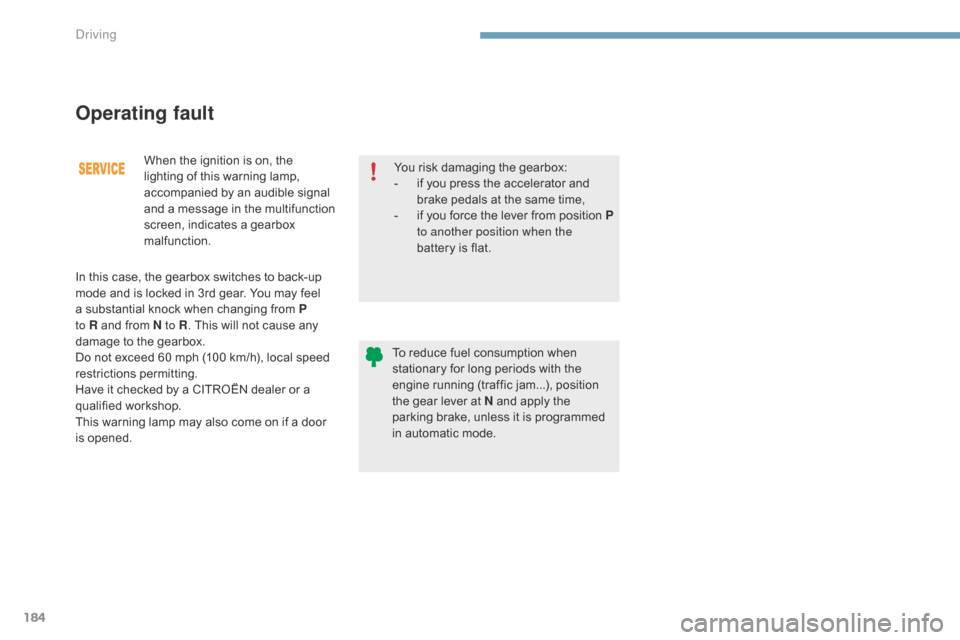
184
When the ignition is on, the lighting of this warning lamp,
a
ccompanied by an audible signal
a
nd a message in the multifunction
s
creen, indicates a gearbox
m
alfunction.
Operating fault
You risk damaging the gearbox:
- i f you press the accelerator and
b
rake pedals at the same time,
-
i
f
y
ou
f
orce
t
he
l
ever
f
rom
p
osition P
to another position when the
battery
is flat.
To
reduce fuel consumption when
s
tationary for long periods with the
e
ngine running (traffic jam...), position
t
he gear lever at N and apply the
p
arking brake, unless it is programmed
i
n automatic mode.
In
this
case,
the
gearbox
switches
to
back-up
m
ode
and
is
locked
in
3rd
gear.
You
may
feel
a
substantial
knock
when
changing
from
P
to R
and
from
N to R .
This
will
not
cause
any
d
amage
to
the
gearbox.
Do
not
exceed
60
mph
(100
km/h),
local
speed
r
estrictions
p
ermitting.
Have
it
checked
by
a
CITROËN
dealer
or
a
q
ualified
w
orkshop.
This
warning
lamp
may
also
come
on
if
a
door
i
s
ope
ned.
Driving
Page 187 of 494
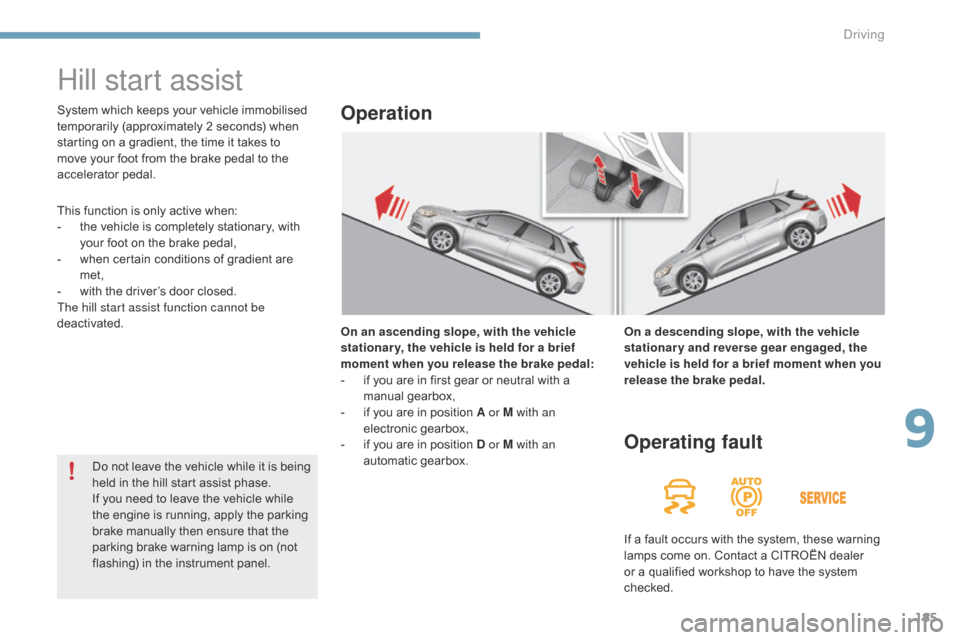
185
Hill start assist
On an ascending slope, with the vehicle
stationar y, the vehicle is held for a brief
moment when you release the brake pedal:
-
i
f you are in first gear or neutral with a
m
anual
g
earbox,
-
i
f you are in position A or M with an
electronic
ge
arbox,
-
i
f you are in position D or M with an
automatic
gearbox.
Operation
On a descending slope, with the vehicle
stationary and reverse gear engaged, the
vehicle is held for a brief moment when you
release the brake pedal.
Operating fault
If a fault occurs with the system, these warning lamps come on. Contact a CITROËN dealer
o
r a qualified workshop to have the system
c
hecked.
System
which
keeps
your
vehicle
immobilised
t
emporarily
(approximately
2
seconds)
when
s
tarting
on
a
gradient,
the
time
it
takes
to
m
ove
your
foot
from
the
brake
pedal
to
the
a
ccelerator
ped
al.
This
function
is
only
active
when:
-
t
he
vehicle
is
completely
stationary,
with
y
our
foot
on
the
brake
pedal,
-
w
hen
certain
conditions
of
gradient
are
m
et,
-
w
ith
the
driver’s
door
closed.
The hill start assist function cannot be
deactivated.
Do
not
leave
the
vehicle
while
it
is
being
h
eld
in
the
hill
start
assist
phase.
If
you
need
to
leave
the
vehicle
while
t
he
engine
is
running,
apply
the
parking
b
rake
manually
then
ensure
that
the
p
arking
brake
warning
lamp
is
on
(not
f
lashing)
in
the
instrument
panel.
9
driving
Page 188 of 494
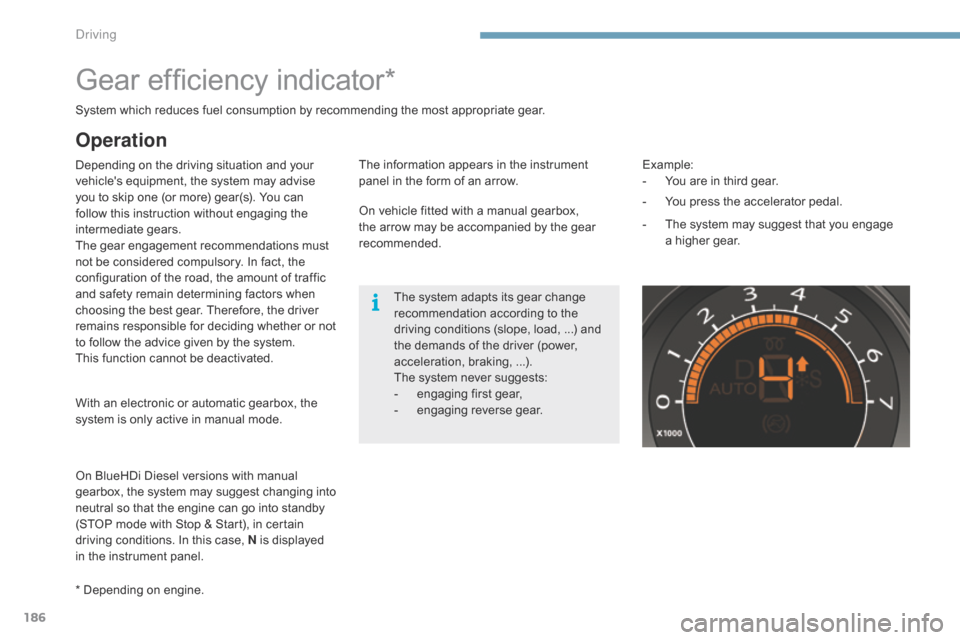
186
Gear efficiency indicator*
Depending on the driving situation and your v
ehicle's equipment, the system may advise
y
ou to skip one (or more) gear(s). You can
f
ollow this instruction without engaging the
i
ntermediate
g
ears.
The
gear engagement recommendations must
n
ot be considered compulsory. In fact, the
c
onfiguration of the road, the amount of traffic
a
nd safety remain determining factors when
c
hoosing the best gear. Therefore, the driver
r
emains responsible for deciding whether or not
t
o follow the advice given by the system.
This
function cannot be deactivated. -
Y
ou press the accelerator pedal.
Example:
-
Y ou are in third gear.
-
T
he system may suggest that you engage
a
higher gear.
The
information appears in the instrument p
anel in the form of an arrow.
System
which reduces fuel consumption by recommending the most appropriate gear.
With an electronic or automatic gearbox, the
s
ystem is only active in manual mode.
*
Depending on engine. On
vehicle fitted with a manual gearbox,
t
he arrow may be accompanied by the gear
re
commended.The
system adapts its gear change
r
ecommendation according to the
d
riving conditions (slope, load, ...) and
t
he demands of the driver (power,
a
cceleration, braking, ...).
The
system never suggests:
-
e
ngaging first gear,
-
enga
ging
r
everse
g
ear.
Operation
On BlueHDi Diesel versions with manual gearbox, t he s ystem m ay s uggest c hanging i nto
n
eutral so that the engine can go into standby
(
STOP mode with Stop & Start), in certain
d
riving conditions. In this case, N is displayed
i
n the instrument panel.
Driving
Page 189 of 494
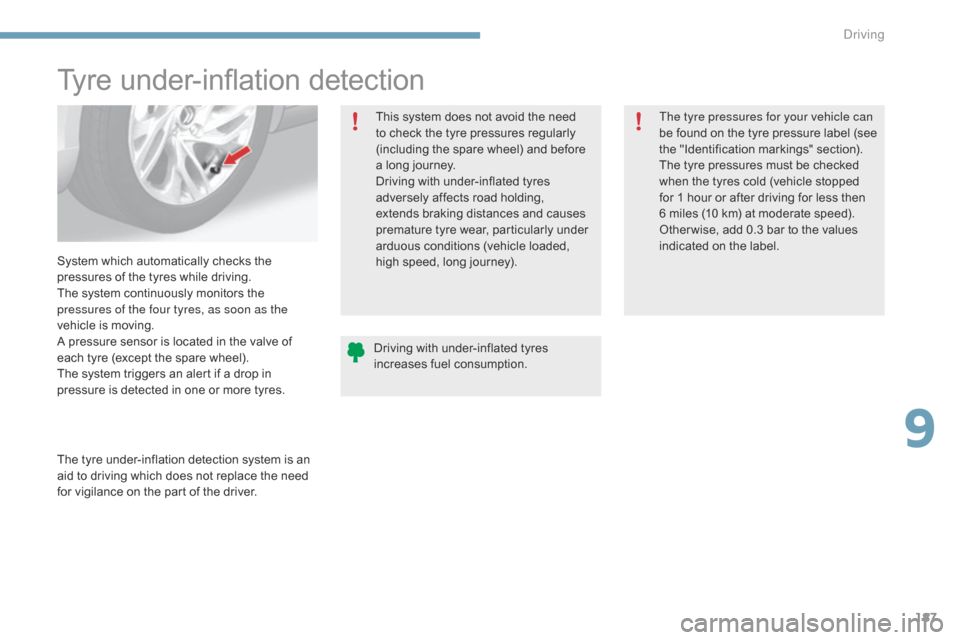
187
Tyre under-inflation detection
System which automatically checks the p
ressures of the tyres while driving.
The
system continuously monitors the
p
ressures of the four tyres, as soon as the
vehicle
is moving.
A
pressure sensor is located in the valve of
e
ach tyre (except the spare wheel).
The
system triggers an alert if a drop in
p
ressure is detected in one or more tyres.
The
tyre under-inflation detection system is an
a
id to driving which does not replace the need
f
or vigilance on the part of the driver.This
system does not avoid the need
t
o check the tyre pressures regularly
(
including the spare wheel) and before
a
long journey.
Driving with under-inflated tyres
a
dversely affects road holding,
e
xtends braking distances and causes
p
remature tyre wear, particularly under a
rduous conditions (vehicle loaded, h
igh speed, long journey).The tyre pressures for your vehicle can
be
found on the tyre pressure label (see
t
he "Identification markings" section).
The tyre pressures must be checked
w
hen the tyres cold (vehicle stopped
f
or 1 hour or after driving for less then
6
miles (10 km) at moderate speed).
O
ther wise, add 0.3 bar to the values i
ndicated on the label.
Driving with under-inflated tyres
i
ncreases fuel consumption.
9
driving
Page 190 of 494
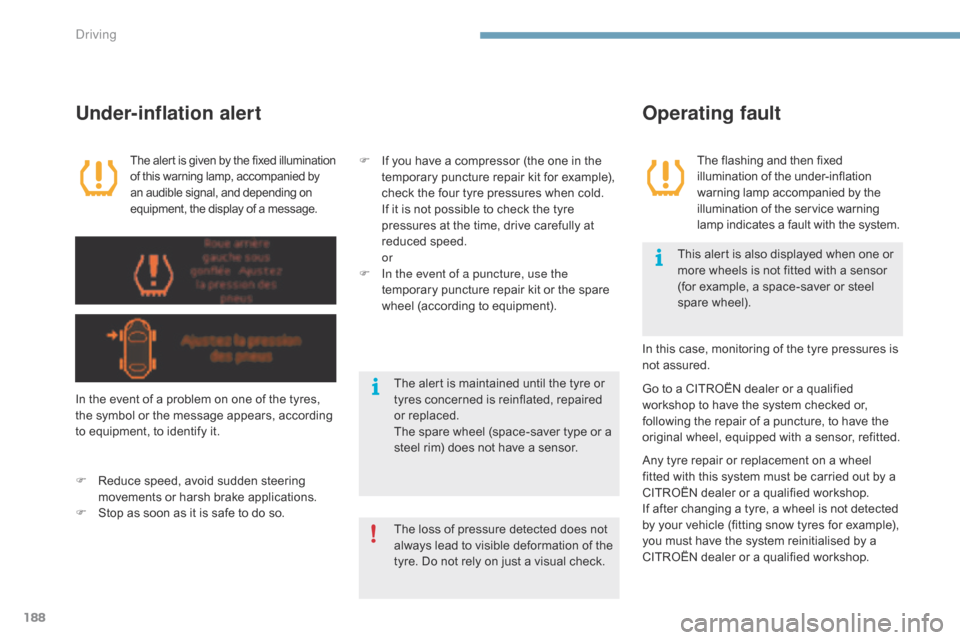
188
The flashing and then fixed illumination of the under-inflation w
arning lamp accompanied by the
i
llumination of the service warning
l
amp indicates a fault with the system.
Operating fault
The aler t is given by the fixed illumination o
f this warning lamp, accompanied by a
n audible signal, and depending on
e
quipment, the display of a message.
Under-inflation alert
In the event of a problem on one of the tyres, the symbol or the message appears, according
t
o equipment, to identify it.
F
R
educe speed, avoid sudden steering
m
ovements or harsh brake applications.
F
S
top as soon as it is safe to do so. In
this case, monitoring of the tyre pressures is
n
ot assured.
F
I
f you have a compressor (the one in the
t
emporary puncture repair kit for example),
c
heck the four tyre pressures when cold.
I
f it is not possible to check the tyre
p
ressures at the time, drive carefully at
r
educed
s
peed.
or
F
I
n the event of a puncture, use the
temporary puncture repair kit or the spare
w
heel (according to equipment).
Go to a CITROËN dealer or a qualified w
orkshop to have the system checked or,
f
ollowing the repair of a puncture, to have the
o
riginal wheel, equipped with a sensor, refitted.
Any
tyre repair or replacement on a wheel
f
itted with this system must be carried out by a
C
ITROËN dealer or a qualified workshop.
If
after changing a tyre, a wheel is not detected
b
y your vehicle (fitting snow tyres for example),
y
ou must have the system reinitialised by a
C
ITROËN dealer or a qualified workshop.
The
loss of pressure detected does not
a
lways lead to visible deformation of the
t
yre. Do not rely on just a visual check.This
alert is also displayed when one or
m
ore wheels is not fitted with a sensor
(
for example, a space-saver or steel
spar
e
w
heel).
The alert is maintained until the tyre or t
yres concerned is reinflated, repaired
o
r replaced.
The
spare wheel (space-saver type or a
s
teel rim) does not have a sensor.
Driving